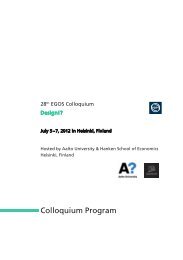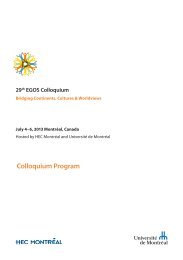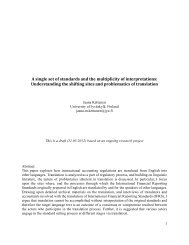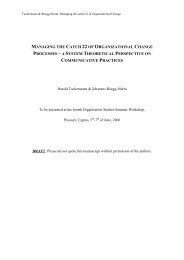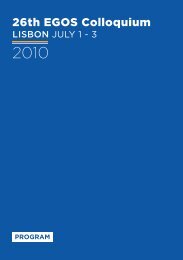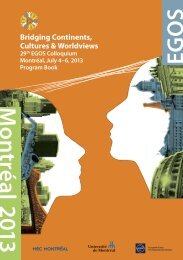Download Full Paper - EGOS
Download Full Paper - EGOS
Download Full Paper - EGOS
Create successful ePaper yourself
Turn your PDF publications into a flip-book with our unique Google optimized e-Paper software.
3. Research design<br />
We use a qualitative case study approach which investigates contemporary phenomena within<br />
its real-life context where the relevant behavior cannot be manipulated (Yin 2003). In the cen-<br />
ter of our analysis lies the personal realm of experience of each interviewee. Their subjective<br />
interpretative model can be comprehended best in an open, explorative and flexible approach.<br />
Thus, a communicative character of the data gathering needs to be accomplished which is best<br />
represented in an explorative research setting with qualitative interviews. They result in a sin-<br />
gle case study. The data is analyzed with a qualitative content analysis to explore qualified<br />
hypotheses (Glaser & Strauss 1967). It enables the researcher to include textual information<br />
and to systematically identify its properties, e.g. the frequencies of most used keywords.<br />
The eight interviews were conducted in October 2010 and lasted between 80 and 100 minutes.<br />
They are part of a larger study exploring the relationship between standardization and innova-<br />
tion in software development organizations, whereas the emphasis lied on CMMI. The Capa-<br />
bility Maturity Model Integration (CMMI) is a standard for software process improvement<br />
(Humphreys 1992). The interviews involved strategic planners, managers responsible for im-<br />
plementation of process management standards, team leaders and software engineers of one<br />
working context (see also Table 1) They were semi-structured to allow flexibility and to en-<br />
sure that we get the focus on interesting phenomena. Further, a narrative interview style was<br />
chosen in order to stimulate reports about a variety of expressions and experiences in terms of<br />
process standards by open, non-assessing questions. Moreover, the interviewers also collected<br />
additional information about the company site by noting their observations about the context<br />
of the interviews and by taking part in a guided tour through the production hall and develop-<br />
ment office.<br />
The subject of the interviewees’ narrations and requests by the interviewer were the history of<br />
the organization and especially the process group; the history, implementation and usage of<br />
process management standards, the procedure of certification audits and the individual and or-<br />
ganizational experiences with process management standards. The interviewees were prefer-<br />
<strong>Full</strong> paper GEY & FRIED <strong>EGOS</strong> conference 2012, Sub-theme 15 5



